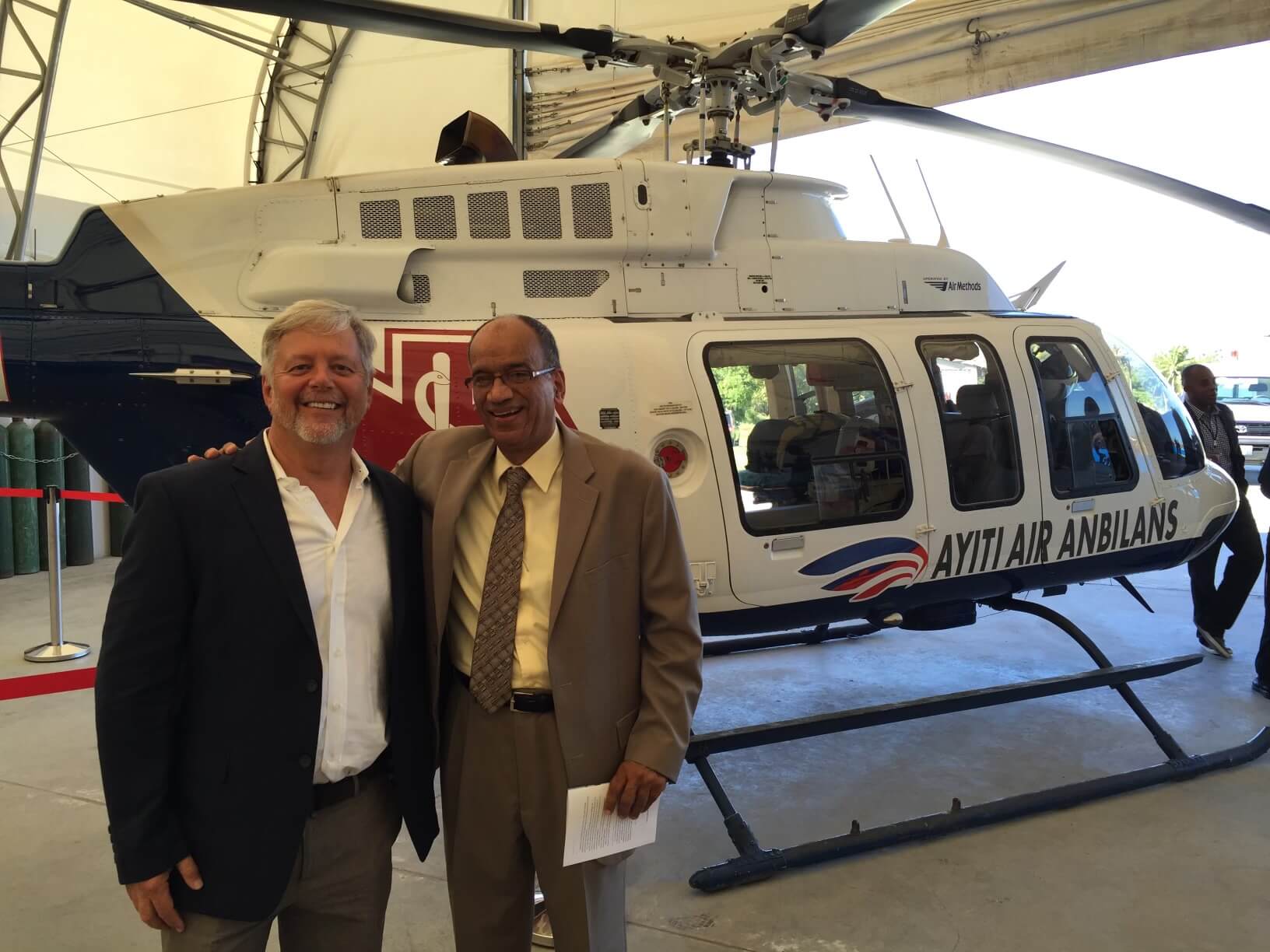Saving Lives from the Sky in Haiti: Nonprofit Haiti Air Ambulance to Be Hailed at Hamptons Event

Edna Jean felt panic as blinding pain shot through her belly. She knew her unborn child — her first — was in trouble, and as she looked outside at her remote farming village in the Haitian countryside, she realized she had few options. The makeshift local ambulances in the area were all broken. The only type of vehicle available was a motorcycle — if she and her baby could survive the brutal 3-hour ride over Haiti’s difficult roads.
“I didn’t know what to do and I had lost all hope,” Edna says.
Fortunately, a nearby doctor had heard of a nonprofit group called Haiti Air Ambulance. Calls went out, and shortly later a miracle occurred. A fully equipped medical helicopter swooped over the copper-tinted hills and settled down in a nearby soccer field. Six men from the village carried her in a stretcher to the landing site, where a crew of emergency medical technicians settled her in the aircraft, stabilized her and flew her to a regional hospital.
The flight took only seven minutes.
HAA “was a grace of God that saved me,” Edna said.
It’s a story of hope that has repeated itself countless times since the 501c3 charity was launched in 2014. On Saturday, Aug. 17, from 6–8 p.m., HAA will introduce itself to the East End community with a cocktail party and reception at the home of Ken and Maria Fishel in Bridgehampton. It will be hosted by Newsday TV’s Elisa DiStefano. Guest speakers include best-selling author Mitch Albom; and Dr. Eric Cioe Pena, VP for Northwell’s Center for Global Health; and Dr. Wesner Jacotin, chief flight physician for Haiti Air Ambulance.
Haiti is the poorest country in the Western hemisphere, a nation of 11 million people that seems to be stuck in an endless chain of tragedies, both natural and man-made. Half the population is considered food insecure. Average wages hover around $3 a day, with some earning much less. As if the string of devastating earthquakes, hurricanes and epidemics weren’t cruel enough … in recent years criminal gangs took over much of the capital and countryside, cutting off roads and choking commerce. Kidnappings and violent crime leave residents in constant fear.
Haiti’s meager healthcare system staggers under that load. Even without the political turmoil, it’s a challenging place to help sick people. Much of it is mountainous and difficult to access.
Roads are often dangerous. If you’re involved in a car accident or suffer a heart attack, it could take hours … or even days, to get to the closest hospital. Ambulances … such as they are … are primitive and frequently unavailable. There are stories of patients being carried for miles on mattresses or in wagons by desperate family members. Getting help within the “Golden Hour” is frequently impossible.
About a year after the savage earthquake demolished the capital of Port Au Prince and killed 300,000 people in 2010 a group of pilots, local leaders and medical professionals came together. Some of them were veterans of the earthquake relief effort, including Pat Dolan, a private pilot who had flown medicine and relief supplies in his twin engine Navajo Chieftain as part of a volunteer airlift.
Dolan — a Long Islander, ex TV reporter, former head of News 12 and current owner/president of Newsday — saw an opportunity to plug a major gap in a healthcare system that served the poorest of the poor.
“Adequate, modern health care is a basic human right. It shouldn’t just be just for the 1%, and it shouldn’t be just for people who are lucky enough to live in an advanced country,” he said.
Dolan formed a working group and strategized with a local hospital and Project MediShare, a partner of the University of Miami medical school. They established a base in an industrial park just outside the Port-Au-Prince international airport. In 2014, Haiti Air Ambulance launched with a pair of state-of-the-art Bell 407 medical choppers.
Since then, HAA has flown more than 2,000 life-saving missions, almost all of them for ordinary Haitians who paid nothing. Cases range from accident victims and heart attacks to severely malnourished children. Forty percent of patients are pregnant mothers and their infants.
“They can count on us to do everything we can do to save their lives”, says Oberto Charles, a native Haitian who was inspired to join HAA after surviving the 2010 earthquake. He is one of several Haitians trained by HAA to become the nation’s first internationally certified aviation emergency medical technicians. Most of HAA’s crew members and flight physicians are Haitian- born.
“We let them know they are not alone,” Oberto said.
Gilbert Castin, a young father who operates a motorcycle taxi, remembers the moment he knew he was not alone. An HAA crew scrambled to rescue his infant daughter when she suddenly started to struggle severely with breathing. After they gave her some initial shots, Castin recalls, “she started to cry. Hearing her cry gave me hope,” he said. “In that moment Haiti Air Ambulance was my savior because no one else could help me.”
As the program developed, its mission expanded. HAA enlarges the pool of caregivers by providing basic emergency life-support training to first responders, educators and community leaders. It flies vaccines, IV fluids and medical supplies to remote villages. And it also coordinates international disaster response, as it did when Haiti was struck by another powerful earthquake in 2021. That’s partly made possible by the partnerships it’s developed with 150 local hospitals and clinics, plus the 220 landing zones it maintains throughout the country.
With the onset of gang roadblocks, HAA’s mission became even more urgent, flying doctors and supplies safely over the trouble spots to where they’re desperately needed.
“The long-term road closures across the country due to gang activity has caused a significant decrease in the access to health care,” said David Ellis, HAA’s executive director and veteran paramedic. “As equitable access to healthcare for all Haitians is a core value of HAA, our mission is more important now than ever.”
The Aug. 17 event in Bridgehampton is the first of what organizers hope will be a series of similar occasions to familiarize the public with HAA’s unique mission and recruit supporters. The group has already received donations from several foundations and is working with local lawmakers to apply for federal grants.
The need is immense, but as Oberto and his HAA crewmates know, the rewards are beyond measure.
“You have not lived today until you’ve done something for someone who can never repay you,” Oberto says.
For more information about Haiti Air Ambulance, visit haitiairambulance.org.
Todd Shapiro is an award-winning publicist and associate publisher of Dan’s Papers.



